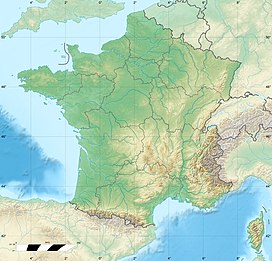Mont Sainte-Victoire
| Montagne Sainte-Victoire | |
|---|---|

Montagne Sainte-Victoire and Croix de Provence
|
|
| Highest point | |
| Elevation | 1,011 m (3,317 ft) |
| Coordinates | 43°32′21″N 5°38′43″E / 43.53917°N 5.64528°ECoordinates: 43°32′21″N 5°38′43″E / 43.53917°N 5.64528°E |
| Geography | |
| Location | Provence-Alpes-Côte d'Azur, France |
| Parent range | Sainte-Victoire Massif |
Montagne Sainte-Victoire — in Provençal Occitan: Venturi / Santa Venturi according to classical orthography and Ventùri / Santo Ventùri according to Mistralian orthography — is a limestone mountain ridge in the south of France which extends over 18 km (11 mi) between the départements of Bouches-du-Rhône and Var. Its highest point is the Pic des mouches at 1,011 metres (3,317 ft); this is not however the highest point in Bouches-du-Rhône, which is instead found in the Sainte-Baume massif. The Croix de Provence is a notable feature of the mountain. At a height of 19 metres, this cross, although not placed at the highest point of the mountain, stands out from the ridge far more than the Pic des Mouches.
The mountain is celebrated for its many appearances in a series of paintings by Paul Cézanne (1839–1906), who could see it from near his house in nearby Aix-en-Provence.
Originally called montagne de la Victoire, the mountain became known by Christians in the Middle Ages as Sainte-Venture. In the 13th century, a chapel was constructed at the summit. It was not until the 17th century that the mountain gained its current name.
In 1989 a fire ravaged over 50 km² of the mountain's south face. Much work has been done to promote reforestation, but the amount of vegetation, particularly conifers, remains much less than it was prior to the fire. Access to the mountain is now largely restricted during the summer.
However, during the periods of free access, the Saint-Victoire massif is a popular destination for hiking, climbing, paragliding and, to a lesser extent, caving. Around 700,000 walkers use its paths every year.
...
Wikipedia

